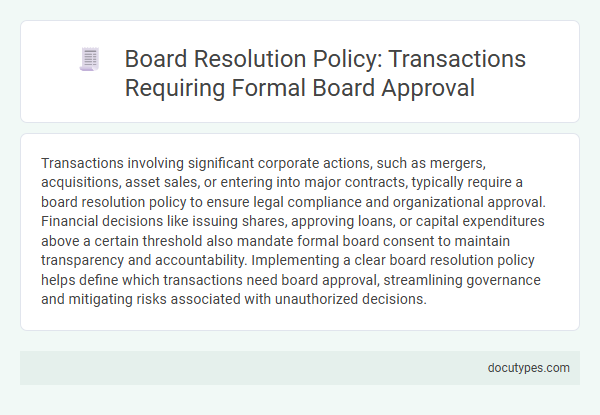Transactions involving significant corporate actions, such as mergers, acquisitions, asset sales, or entering into major contracts, typically require a board resolution policy to ensure legal compliance and organizational approval. Financial decisions like issuing shares, approving loans, or capital expenditures above a certain threshold also mandate formal board consent to maintain transparency and accountability. Implementing a clear board resolution policy helps define which transactions need board approval, streamlining governance and mitigating risks associated with unauthorized decisions.
Introduction to Board Resolution Policy
A Board Resolution Policy defines the types of transactions that require formal approval from the board of directors. You must understand this policy to ensure compliance and proper governance within your organization.
- Major Financial Transactions - Transactions involving significant expenditures or investments require board resolution for transparency and control.
- Contract Approvals - Entering into binding agreements exceeding predefined thresholds mandates board approval to mitigate risks.
- Corporate Governance Decisions - Actions such as mergers, acquisitions, and changes in company structure must be authorized by the board to maintain legal compliance.
Purpose and Scope of the Policy
This policy defines the types of transactions that require a board resolution to ensure transparent and accountable decision-making. Its purpose is to establish clear guidelines for significant financial, contractual, and strategic actions that impact the organization. You must refer to this policy to determine when board approval is mandatory, covering transactions such as mergers, acquisitions, large capital expenditures, and major contracts.
Definition of Formal Board Approval
A formal board approval refers to the official authorization granted by a company's board of directors for significant business actions. Transactions typically requiring board resolution include mergers, acquisitions, capital raising, and approval of major contracts. This policy ensures that all critical corporate decisions undergo proper scrutiny and compliance to protect stakeholder interests.
Types of Transactions Requiring Board Resolutions
Certain significant corporate actions mandate a board resolution to ensure legal compliance and proper governance. These include the approval of mergers, acquisitions, and major financial investments.
Other transactions requiring board resolutions are the issuance of shares, approval of loans or credit facilities, and appointment or removal of key executives. Your board must also authorize contracts exceeding specified financial thresholds and decisions regarding company assets.
Criteria for Board Approval of Transactions
What types of transactions require a board resolution policy? Transactions involving significant financial commitments, mergers, acquisitions, and amendments to corporate bylaws typically necessitate board approval. Your board must evaluate transactions based on their impact on company assets, legal obligations, and strategic direction to ensure compliance and governance standards are met.
Process for Submitting Transactions for Board Approval
Certain transactions must undergo a formal board resolution to ensure legal compliance and organizational transparency. Understanding the process for submitting these transactions for board approval is essential for smooth governance.
The submission process includes clear documentation, timely notification, and proper agenda inclusion to facilitate informed decision-making.
- Identify Required Transactions - Transactions such as asset purchases, loans, mergers, and significant contracts typically require board resolution.
- Prepare Submission Documents - Compile detailed proposals, financial reports, and relevant supporting materials for board review.
- Submit for Board Meeting - You must formally present the transaction to the board secretary well before the scheduled meeting date to ensure proper agenda listing and distribution.
Documentation and Recording of Board Resolutions
Board resolutions are essential for formalizing key decisions within an organization, ensuring legal compliance and clear accountability. Transactions involving significant financial commitments, asset acquisitions, or changes in corporate structure typically require a board resolution to be valid.
Proper documentation and recording of board resolutions provide a transparent record of decisions made by the board, safeguarding the organization's interests. Your records should include detailed minutes, signed copies of the resolutions, and proper filing in corporate registers. Accurate documentation facilitates audits, legal reviews, and future reference, reinforcing governance standards.
Roles and Responsibilities of Board Members
| Transaction Type | Requirement for Board Resolution | Roles and Responsibilities of Board Members |
|---|---|---|
| Approval of Annual Budgets | Mandatory board resolution before implementation | Review detailed financial plans, assess resource allocation, and authorize budget to ensure fiscal responsibility |
| Major Capital Expenditures | Board resolution required for acquisitions or investments above threshold limits | Evaluate investment proposals, assess risk and benefits, authorize capital spending aligned with strategic objectives |
| Appointment of Senior Executives | Board resolution needed to confirm hiring or termination of C-suite officers | Conduct selection process oversight, approve final candidates, monitor executive performance and succession planning |
| Entering into Significant Contracts | Board must resolve approval for contracts exceeding defined financial limits or strategic importance | Analyze contract terms, ensure alignment with company goals, authorize execution to mitigate legal and financial risks |
| Issuance or Redemption of Shares | Resolution mandatory to authorize share issuance or buyback programs | Review equity structure impact, approve terms and conditions, safeguard shareholder interests and regulatory compliance |
| Approval of Mergers, Acquisitions, or Disposals | Board resolution essential before executing transactions affecting company ownership | Conduct due diligence, assess strategic fit, approve transaction terms, protect stakeholder value |
| Changes to Company Bylaws or Governance Policies | Formal resolution required to amend bylaws or governance frameworks | Evaluate proposed amendments, ensure compliance with laws and best practices, formalize governance enhancements |
Compliance and Legal Considerations
Board resolution policies are essential for ensuring compliance in significant corporate transactions. These policies specify which transactions require formal approval from the board of directors to meet legal and regulatory standards.
Transactions such as mergers, acquisitions, asset sales, and entering into major contracts typically require a board resolution. Your adherence to these policies safeguards the organization from legal risks and ensures transparent decision-making.
What Types of Transactions Require a Board Resolution Policy? Infographic

